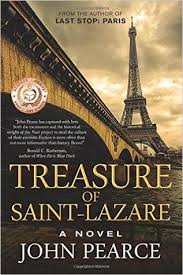Our hero, Eddie Grant, he of the chiseled jaw, martial arts belts, multi-lingual talents, and accomplished lady killer …. [Is there nothing beyond him?]

The set up is this. Ed (I refuse to call a grown man with such a cv as above Eddie) is the son of World War II veteran whose assignment in 1944-1946 was tracking down art looted by Nazis. His father died earlier, in suspicious circumstances that Ed mentions but apparently was not motivated to do anything about at the time. Then the father’s assistant from the wartime assignment dies, again in suspicious circumstances. This assistant left a letter to Ed’s father, not knowing he had predeceased him, and asked that his executor deliver it by hand.
Since the dad is dead the messenger, a daughter, delivers it to Ed. She is of course a beautiful woman who falls under Ed’s spell, taking her place in the queue.
It just so happens that Ed has many contacts in the worlds of policing and art, and these he now mobilises. Why he did not mobilise them when his father died is unknown. Even more mysterious is why he did not mobilise them when his wife and child were murdered after his father’s mysterious death. All of this death is supposed to awaken sympathy I suppose but it just makes Ed seem a jinx and jerk. Four dead before he goes into action.
Then the big black Mercedes limousine appears bearing — as it must — Germans.
So much for subtlety. The plot is by the numbers and the characterisation are connect the dots.
I quit at about 25% on the Kindle. I was reading topic sentences only and flipping on; it was time to move on.
At the start there is much too much backstory forced into the opening pages so that we may appreciate Ed, followed later by extensive and pointless descriptions of hairstyles. clothing, drinks, furnishings, cars, and so on and on. This later I guess is the Paris part. If this superfluous detail were cut to the standard say of Georges Simenon the text would reduce by more than two-thirds. Good grief. Amid all the bland descriptions there is very little story. With John Stuart Mill, I suppose that we know a person by deeds not by the recitation of a backstory. What do I care about the backstory until there is a front story?
Nor is it possible to warm to Ed for whom everything seems to come easily though he moans and groans about it.
This is described as ‘a novel of Paris’ and I wanted to test that proposition. There is much Paris in the early going and I consulted by Michelin map, but then we head off to Orlando in Florida and…. I supposed it gets back to Paris but without me. The Florida trip seems mostly to be an occasion for more pointless description.
After re-reading all of Iain Pears krimis with Jonathan Argyll and Flavia di Stefano chasing lost paintings the reference to a lost Raphael was intriguing, but this treatment is not arresting for this reader.
I had a look at the comments on Good Reads to see what I was missing. I looked at the effusive ones, further confirmation that this source is not credible.
 John Pearce
John Pearce
Speaking of sources without credibility, one of the local rags has a weekend feature called something like ‘Books that made me’ in which minor celebrities, well I guess they are but they are unknown to me, list and comment, briefly, on five books that had a formative impact of their being. Nice idea, but the execution is kindergarten.
These celebrities seem not to do much reading and certainly not of, say, a novel of consequence or a historical study of insight. Instead we have excited drivel over self-help manuals, diet plans, children’s books – see I said kindergarten – and Mills and Boon stories, Alice’s adventures. In some cases it is pretty clear it was a stretch for the subject to think of five books. When one of these pieces refers to ‘Death in Venice,’ ‘Swann’s Way,’ ‘Absalom, Absalom,’ ‘The Iliad,’ ‘Crime and Punishment,’ ‘Hotel Baltimore’ and their kind, let me know.
Skip to content
